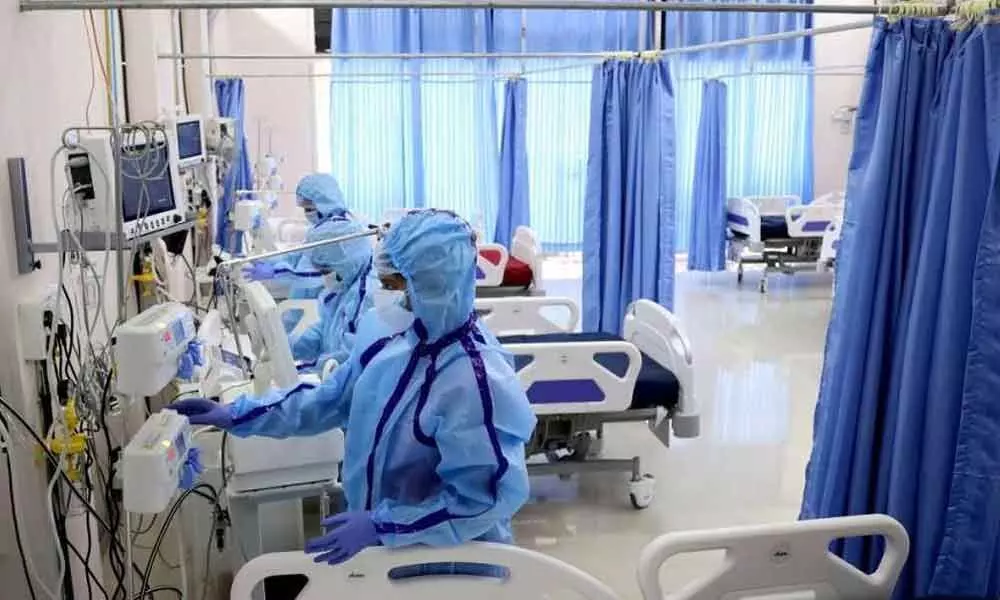Live
- Sensex surges 855 pts despite geo-political tensions, PSU bank stocks shine
- ED likely to question some Dubai-based Indians in Bengal ration scam case
- Minor quake hits Manipur's Bishnupur district
- BJP's Bihar leaders huddle at Union Minister Giriraj Singh's Delhi residence
- 10 Maoists gunned down in encounter with security forces in Sukma
- K’taka parties keenly await bypoll results, spotlight on high-profile Channapatna
- Hyderabad Student Aryan Reddy Dies in Tragic Gun Misfire Accident on His Birthday in Atlanta
- Iraqi PM, Putin discuss regional situation, energy cooperation over phone
- Pushpa 2 Shooting Still Pending? Will It Release on Time?
- Can air pollution affect weight gain and hormonal health?
Just In
Reinfection case in city hospital worries Sudhakar


Reinfection case in city hospital worries Sudhakar
A day after a private hospital reported possibly the state’s first reinfection case, Medical Education Minister Dr K Sudhakar on Monday instructed the officials to conduct a clinical study on reinfection cases in the state
Bengaluru: A day after a private hospital reported possibly the state's first reinfection case, Medical Education Minister Dr K Sudhakar on Monday instructed the officials to conduct a clinical study on reinfection cases in the state.
In a meeting with the taskforce officials at Vidhana Soudha, the minister said several countries have reported reinfection cases and each nation cited different factors for reinfection cases.
On Sunday, the Fortis Hospital management stated that it has admitted a reinfection case in its hospital. The 27-year-old was tested positive in July after she showed mild symptoms of fever and cough. She was admitted in Fortis Hospital in Bannerghatta Road in the city. She completely recovered after treatment and subsequently discharged from the hospital on July 23. In the first week of August, she again showed mild symptoms of cold, cough and fever. Upon conducting tests, it was found that she was Covid-19 positive.
Interacting with officials, Sudhakar directed them to thoroughly evaluate the factors that led to the reinfection. The woman has no history of comorbidities and was tested COVID positive in the month of July after she developed mild symptoms of fever and cough.
Expressing anguish over the reinfection in Bengaluru, Sudhakar said the incident should be dealt with carefully and drive away the fear in people. During the course of the meeting, an official said that when a person recovers from Covid-19, it takes at least 15 days to produce white blood cells and this might lead to reinfection in some patients.
The minister has posed several questions regarding measures taken to treat Covid patients who have recovered and the precautions taken by the patients.
Responding to this, the minister sought more clarity on such reinfection cases and instructed the officials to submit a report regarding the treatment of special cases such as this in other states.
Stating that Covid-19 could be contained at booth-level, Sudhakar said it is easier to raise awareness and conduct tests at the booth-level. He opined that this can be managed well if the responsibility is given to the Urban Development Minister, Byrati Basavaraj.
On Sunday, the Fortis Hospital at the Bannerghatta Road had issued a statement that the 27-year-old woman has been found to be the "first" confirmed victim of COVID-19 reinfection in the city. The hospital''s Infectious Diseases Consultant Dr Pratik Patil has said that in the first week of July, the patient was symptomatic (fever, cough and sore throat) and tested positive. She was admitted to the hospital and recovered well.
A repeat test was conducted on her, which turned out to be negative post which she was discharged on July 24. However, nearly after one month, in the last week of August she developed mild symptoms again and had been tested positive again, Patil said in a statement. Meanwhile, Indian Council of Medical Research told The Hans India that the reinfection case in Bengaluru should be treated as a rare occurence.
Dr Giridhar Babu from ICMR, Research Task Force said, "It is a rare case. It has come to notice after 3.8 lakh confirmed Covid cases. The good news is that the second infection is less severe than the first. It is difficult to establish reinfection. Studies in future can tell about the extent of reinfection," he said.
"Normally, in case of infection, the Covid Immunoglobulin G antibody is tested positive after 2-3 weeks of infection. However, in this patient, the antibody has been tested negative, which means she did not develop immunity after infection. A reinfection case means that the antibodies may not be produced in every individual or if they do develop, they may not last enough, triggering reinfection," Dr Patil stated.

© 2024 Hyderabad Media House Limited/The Hans India. All rights reserved. Powered by hocalwire.com






